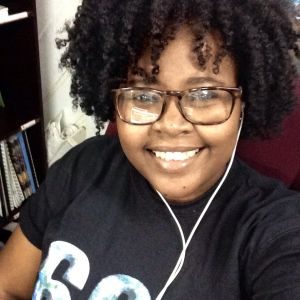
Nakasi Fortune
Director of Continuing Education
Sterling College
Craftsbury Common,
Roles at NAAEE
Languages
Interests
An early career higher education professional with a background in Environmental Studies and Education, Project Management and Volunteer Coordination
Read More
Linden, Guyana & Craftsbury Common, VT, United States
Age: 28
Tell us a bit about yourself!
I am from beautiful Guyana, also known as the Land of Many Waters, and the only English speaking country in South America. I am proud to be Guyanese. Currently, I am an Environmental Education major at Sterling College in Craftsbury Common, Vermont. Before this, I volunteered with the Guyana Youth and Environment Network. I have, over the years, developed a number of projects that seek to raise awareness about current environmental issues, the role that humans play in contributing to them, and solutions that can be implemented, and to cause a shift in the way we view the environment and our attitude towards environmental protection. Two of my favorite projects that I’m involved with are Earth Hour Guyana and Shaping Young Eco-Changemakers, both of which are in their fifth year.
Earth Hour is a global movement that shines a light on climate change and encourages people to turn off their non-essential lights for one hour (or more) as a sign of their commitment to mitigating climate change. Shaping Young Eco-Changemakers Environmental Day Camp is the brainchild of myself and my colleague, Dionne Cush-Barnwell, and targets children and teens between the ages of 6 to 14 years old to introduce them to basic environmental concepts and problems within Guyana and ways they can help.
What inspired you to become a champion for the environment and environmental education?
There are two moments, in 2009, that led to me wanting to be a champion for the environment. The first was when I sat through a presentation about wetlands in Guyana, by a young woman who spoke with so much conviction about the great work she was doing and the impact that it had, that I said to myself right there and then “when I grow up I want to be just like her.” The second happened when I went on a fieldtrip to Pibiri, Guyana, where I decided that I was meant to work outdoors. I didn’t have a name for what I wanted to do, but I knew that whatever I did had to be in nature. A few years later, the situation in my country was such that I needed to be the change that I wanted to see, and I started volunteering with remarkable young people who were just as committed to the environment as I was. As a team, and with successes and challenges, we started to develop solutions to the problems we saw. My love for my country and for the environment has kept me motivated and pushed me to pursue a career in environmental education.
What advice would you give to the next generation of leaders that are looking to bring about positive change in their communities through EE?
My advice is simple - you have to love what you do. That love manifests itself in a variety of ways and will keep you working even, and especially, during times when it becomes overwhelming and tiresome. Love keeps you connected to your “why.” Furthermore, as environmental educators you have to be willing to create safe and compassionate spaces for whomever you are teaching, whether it is in a formal or non-formal setting. It is not enough to stand and deliver; you have to shape and create moments of discovery and reflection so that students are active participants in their learning and unlearning. Get them outdoors as much as possible, too.
Who do you look up to as inspiration for your work?
There are a number of people I look up to for inspiration, some older and some my age or even younger. I have been fortunate to meet and work with some of the most passionate and committed environmentalists, both in my home country and now in Vermont. To name a few: Aiesha Williams, Dr. Raquel Thomas-Caesar, Odacy Davis, Godfrey Scott and the scores of young people with whom I volunteer. Their work ethic, professionalism and willingness to create spaces of learning and development has contributed significantly to my growth as an environmentalist and educator.
If you had to live in one place for the rest of your life, where would it be?
At this stage in my life, if I had to choose, it would be the North Rupununi region in Guyana. I have only visited once, but I felt closest to God while there. There was a feeling of peace and stillness that encompassed me, and I am yet to feel it again in all of my travels since then. The landscape is so beautiful that it gives you pause. It looks like a painting and you think to yourself, “Wow, Mother Nature really showed off here.” It takes your breath away. Also, the people there are some of the kindest I have ever encountered, and they made the experience even more incredible.
User Activity
No activity yet.
